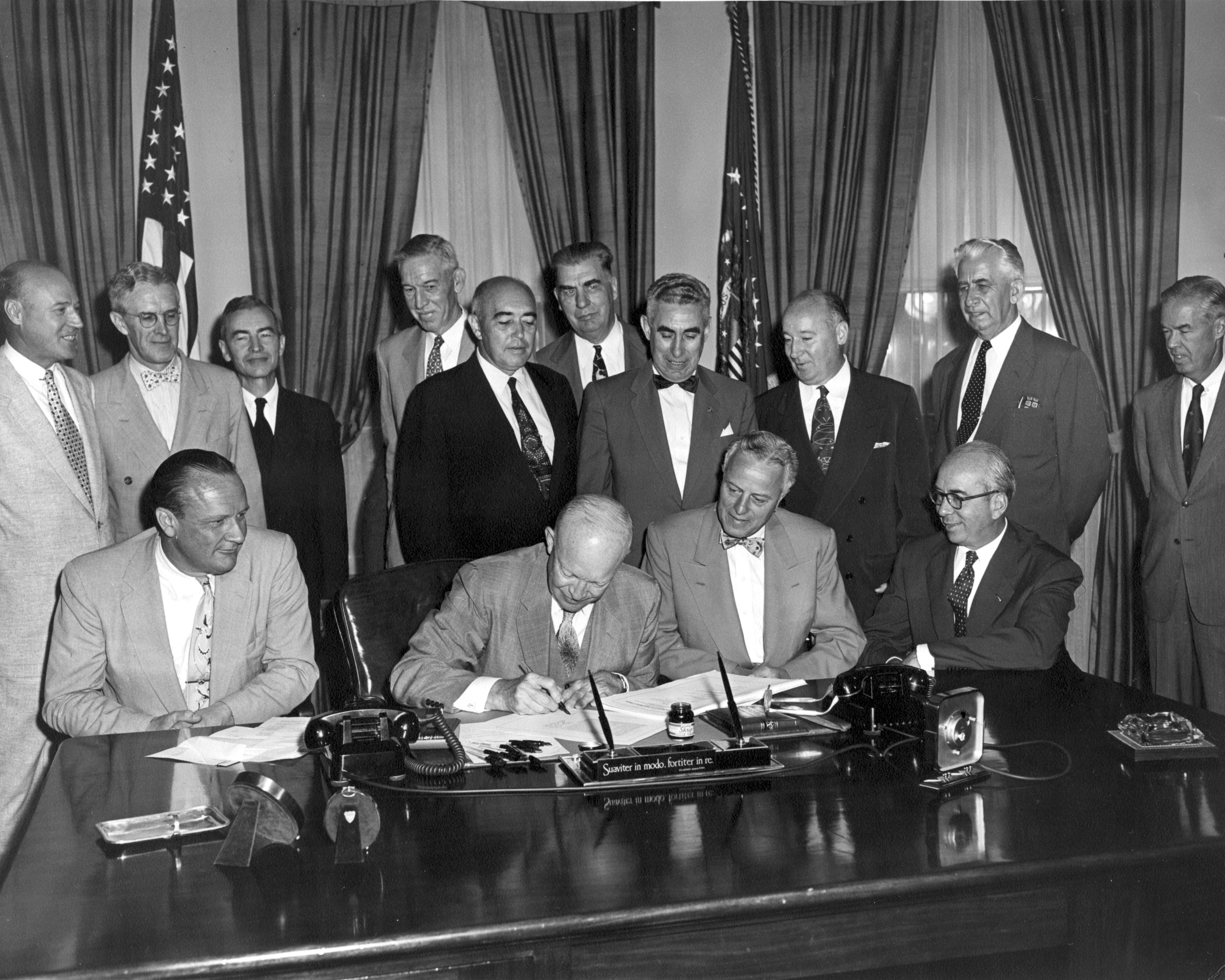|
Clare E. Hoffman
Clare Eugene Hoffman (September 10, 1875 – November 3, 1967) was a United States representative from Michigan's 4th congressional district. Background Hoffman was born in Vicksburg, Union County, Pennsylvania, where he attended the public schools. He graduated from the law department of Northwestern University in Evanston, Illinois, in 1895. Career Hoffman was admitted to the Michigan Bar in 1896 and commenced practice in Allegan, Michigan, where he also became prosecuting attorney for the county from 1904–1910. In 1934, Hoffman ran as the Republican candidate for Michigan's 4th congressional district, defeating incumbent Democrat George Ernest Foulkes. Hoffman was elected to the Seventy-fourth United States Congress and was re-elected to the thirteen succeeding Congresses, serving from January 3, 1935 until January 3, 1963. He was seen as "a bitter lone wolf" during much of his time in office, unable to work with either the Democrats or the Republicans. Hoffman ... [...More Info...] [...Related Items...] OR: [Wikipedia] [Google] [Baidu] |
Michigan
Michigan () is a state in the Great Lakes region of the upper Midwestern United States. With a population of nearly 10.12 million and an area of nearly , Michigan is the 10th-largest state by population, the 11th-largest by area, and the largest by area east of the Mississippi River.''i.e.'', including water that is part of state territory. Georgia is the largest state by land area alone east of the Mississippi and Michigan the second-largest. Its capital is Lansing, and its largest city is Detroit. Metro Detroit is among the nation's most populous and largest metropolitan economies. Its name derives from a gallicized variant of the original Ojibwe word (), meaning "large water" or "large lake". Michigan consists of two peninsulas. The Lower Peninsula resembles the shape of a mitten, and comprises a majority of the state's land area. The Upper Peninsula (often called "the U.P.") is separated from the Lower Peninsula by the Straits of Mackinac, a channel that joins Lak ... [...More Info...] [...Related Items...] OR: [Wikipedia] [Google] [Baidu] |
Polio Vaccine
Polio vaccines are vaccines used to prevent poliomyelitis (polio). Two types are used: an inactivated poliovirus given by injection (IPV) and a weakened poliovirus given by mouth (OPV). The World Health Organization (WHO) recommends all children be fully vaccinated against polio. The two vaccines have eliminated polio from most of the world, and reduced the number of cases reported each year from an estimated 350,000 in 1988 to 33 in 2018. The inactivated polio vaccines are very safe. Mild redness or pain may occur at the site of injection. Oral polio vaccines cause about three cases of vaccine-associated paralytic poliomyelitis per million doses given. This compares with 5,000 cases per million who are paralysed following a polio infection. Both types of vaccine are generally safe to give during pregnancy and in those who have HIV/AIDS but are otherwise well. However, the emergence of circulating vaccine-derived poliovirus (cVDPV), a form of the vaccine virus that has rever ... [...More Info...] [...Related Items...] OR: [Wikipedia] [Google] [Baidu] |
1875 Births
Events January–March * January 1 – The Midland Railway of England abolishes the Second Class passenger category, leaving First Class and Third Class. Other British railway companies follow Midland's lead during the rest of the year (Third Class is renamed Second Class in 1956). * January 5 – The Palais Garnier, one of the most famous opera houses in the world, is inaugurated in Paris. * January 12 – Guangxu Emperor, Guangxu becomes the 11th Qing Dynasty Emperor of China at the age of 3, in succession to his cousin. * January 14 – The newly proclaimed King Alfonso XII of Spain (Queen Isabella II's son) arrives in Spain to restore the monarchy during the Third Carlist War. * February 3 – Third Carlist War – Battle of Lácar: Carlist commander Torcuato Mendiri, Torcuato Mendíri secures a brilliant victory, when he surprises and routs a Government force under General Enrique Bargés at Lácar, east of Estella, nearly capturing newly cr ... [...More Info...] [...Related Items...] OR: [Wikipedia] [Google] [Baidu] |
United States Congressional Delegations From Michigan
These are tables of congressional delegations from Michigan to the United States House of Representatives and the United States Senate. The current dean of the Michigan delegation is Representative Fred Upton (MI-6), having served in the House since 1987. U.S. House of Representatives Current members List of members of the Michigan United States House delegation, their terms in office, district boundaries, and the district political ratings according to the CPVI. The delegation has a total of 14 members, with 7 Democrats and 7 Republicans. Delegates from Michigan Territory Members of the House from Michigan 1837–1843 1843–1853 1853–1863 1863–1873 1873–1883 1883–1893 1893–1915 1915–1933 1933–1965 1965–1993 1993–2013 2013–2023 United States Senate Senate delegation timeline (1835–present) Tables showing membership in the Michigan federal Senate delegation throughout history of statehood in the United States. ... [...More Info...] [...Related Items...] OR: [Wikipedia] [Google] [Baidu] |
American National Biography
The ''American National Biography'' (ANB) is a 24-volume biographical encyclopedia set that contains about 17,400 entries and 20 million words, first published in 1999 by Oxford University Press under the auspices of the American Council of Learned Societies. Background A 400-entry supplement appeared in 2002. Additional funding came from the Rockefeller Foundation, the Andrew W. Mellon Foundation and the National Endowment for the Humanities. The ''ANB'' bills itself as the successor of the ''Dictionary of American Biography'', which was first published between 1926 and 1937. It is not, however, a strict superset of this older publication; the selection of topics was made anew. It is commonly available in the reference sections of United States libraries, and is available online by subscription (see external links). Awards and reception In 1999, the American Library Association awarded the ''American National Biography'' its Dartmouth Medal as a reference work of outstand ... [...More Info...] [...Related Items...] OR: [Wikipedia] [Google] [Baidu] |
88th United States Congress
The 88th United States Congress was a meeting of the legislative branch of the United States federal government, composed of the United States Senate and the United States House of Representatives. It met in Washington, D.C. from January 3, 1963, to January 3, 1965, during the last year of the administration of U.S. President John F. Kennedy, and the first of the administration of his successor, U.S. President Lyndon B. Johnson. The apportionment of seats in this House of Representatives was based on the Eighteenth Census of the United States in 1960, and the number of members was again 435 (it had temporarily been 437 in order to seat one member each from recently admitted states of Alaska and Hawaii). Both chambers maintained a Democratic majority - including a filibuster-proof supermajority in the Senate - and with President Kennedy, the Democrats maintained an overall federal government trifecta. Major events * November 22, 1963: Vice President Lyndon B. Johnson became ... [...More Info...] [...Related Items...] OR: [Wikipedia] [Google] [Baidu] |
83rd United States Congress
The 83rd United States Congress was a meeting of the legislative branch of the federal government of the United States in Washington, D.C. from January 3, 1953, until January 3, 1955, during the last two weeks of the Truman administration, with the remainder spanning the first two years of Dwight Eisenhower's presidency. It was composed of the Senate and the House of Representatives. The apportionment of seats in the House was based on the 1950 U.S. Census. The Republicans gained the majority in both chambers, winning back full control of Congress for the first time since the 80th Congress in 1947, and with Dwight Eisenhower being sworn in as President on January 20, 1953, this gave the Republicans an overall federal government trifecta for the first time since the 71st Congress in 1929. Major events * January 20, 1953: Dwight Eisenhower is sworn in as President of the United States in his first inauguration * March 1, 1954: U.S. Capitol shooting incident * December 2 ... [...More Info...] [...Related Items...] OR: [Wikipedia] [Google] [Baidu] |
United States House Committee On Government Operations
Government spending or expenditure includes all government consumption, investment, and transfer payments. In national income accounting, the acquisition by governments of goods and services for current use, to directly satisfy the individual or collective needs of the community, is classed as government final consumption expenditure. Government acquisition of goods and services intended to create future benefits, such as infrastructure investment or research spending, is classed as government investment (government gross capital formation). These two types of government spending, on final consumption and on gross capital formation, together constitute one of the major components of gross domestic product. Government spending can be financed by government borrowing, taxes, custom duties, the sale or lease of natural resources, and various fees like national park entry fees or licensing fees. When Governments choose to borrow money, they have to pay interest on the money borro ... [...More Info...] [...Related Items...] OR: [Wikipedia] [Google] [Baidu] |
80th United States Congress
The 80th United States Congress was a meeting of the legislative branch of the United States federal government, composed of the United States Senate and the United States House of Representatives. It met in Washington, DC from January 3, 1947, to January 3, 1949, during the third and fourth years of Harry S. Truman's presidency. The apportionment of seats in this House of Representatives was based on the Sixteenth Census of the United States in 1940. The Republicans won the majority in both chambers, marking the first time since the 71st Congress they held full control of Congress, and the first time since the 72nd Congress they held either of the two chambers. This also ended a 14-year Democratic overall federal government trifecta, dating back to the 73rd Congress. Although the 80th Congress passed a total of 906 public bills, President Truman nicknamed it the "Do Nothing Congress" and, during the 1948 election, campaigned as much against it as against his formal oppone ... [...More Info...] [...Related Items...] OR: [Wikipedia] [Google] [Baidu] |
United States House Committee On Expenditures In The Executive Departments
The Committee on Oversight and Reform is the main investigative committee of the United States House of Representatives. The committee's broad jurisdiction and legislative authority make it one of the most influential and powerful panels in the House. Its chairman is one of only three in the House with the authority to issue subpoenas without a committee vote or consultation with the ranking member. However, in recent history, it has become practice to refrain from unilateral subpoenas. Carolyn Maloney ( D-New York) served as acting chair of the committee following the death of Elijah Cummings ( D-Maryland) on October 17, 2019; she was elected chair a month later. Representative Jim Jordan served as ranking member from January 3, 2019, until March 12, 2020. On March 31, 2020, Jordan started his second stint as ranking member. Representative Mark Meadows served as ranking member from March 13, 2020, until March 30, 2020, when he resigned his congressional seat to become White Ho ... [...More Info...] [...Related Items...] OR: [Wikipedia] [Google] [Baidu] |
America First Party (1944)
The America First Party was an isolationist political party which was founded on January 10, 1943. Its leader, Gerald L. K. Smith, was the party's presidential candidate in the 1944 U.S. presidential election. Background The America First Party advocated a reactionary version of isolationism advanced by Smith after he split from his support of the Republican “Old Guard.” It was notable for “flourishes of racism and Anti-Semitism.” In March 1944, Smith stated that he and his associates in the party favored Charles A. Lindbergh for president of the United States. When Wendell Willkie withdrew from the race for the 1944 Republican presidential nomination on April 5, following his complete loss of the Wisconsin primary in which New York Governor Thomas E. Dewey, Harold Stassen, and General Douglas MacArthur claimed all the delegates, Gerald L. K. Smith proclaimed that the candidate's decision “was a great victory for the America First people.” Willkie had stated duri ... [...More Info...] [...Related Items...] OR: [Wikipedia] [Google] [Baidu] |
Fascism
Fascism is a far-right, authoritarian, ultra-nationalist political ideology and movement,: "extreme militaristic nationalism, contempt for electoral democracy and political and cultural liberalism, a belief in natural social hierarchy and the rule of elites, and the desire to create a (German: “people’s community”), in which individual interests would be subordinated to the good of the nation" characterized by a dictatorial leader, centralized autocracy, militarism, forcible suppression of opposition, belief in a natural social hierarchy, subordination of individual interests for the perceived good of the nation and race, and strong regimentation of society and the economy. Fascism rose to prominence in early 20th-century Europe. The first fascist movements emerged in Italy during World War I, before spreading to other European countries, most notably Germany. Fascism also had adherents outside of Europe. Opposed to anarchism, democracy, pluralism, liberalism ... [...More Info...] [...Related Items...] OR: [Wikipedia] [Google] [Baidu] |



.jpg)





.jpg)